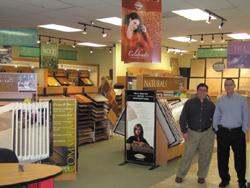Best Practices - January 2008
By Kemp Harr
Success often comes to those who do things a little differently and that’s exactly what we found at Capital Carpet and Tile located on the southeast coast of Florida about 50 miles north of Miami. Even though this retailer is located in Florida—which recently ranked third in foreclosure rates in the U.S. behind Nevada and California—business has not suffered nearly as much as other flooring retailers in the same area.
Store owner Lou Morano began in the retail flooring business as a salesperson for a northern retailer. While on vacation in Florida, he recognized an underserved market opportunity, so he and his father opened the business in 1985. Now he has five locations in Palm Beach County, 35 employees and his stores bring in approximately $11 million a year in sales.
He attributes much of his success to his loyal employees, whom he treats like family members. Many of them have been with him from the start. Family is a big part of Morano’s business. His mother handles quality control, managing a critical component of the store’s success—customer feedback. After each installation Capital Carpet and Tile mails out a customer satisfaction survey. Once feedback arrives, it is shared with store staff and installation crews. A point system based on the feedback rewards installers for positive comments. This gives installers added incentive to perform well on Capital Carpet and Tile jobs.
The majority of the promotional budget goes toward local television ads. In addition, the stores use an Internet pay-per-click system called “Smartlink,” which costs about $850 a month. It proves its effectiveness by linking site traffic to store phone calls and ultimately to store traffic.
From January through March, the peak period for flooring sales in south Florida, the stores have five one-day sales to bring customers in. These sales are promoted through direct mail, and Mail America handles the job.
Capital Carpet and Tile exhibits at four home shows per year—two in the spring and two in the fall.
From a research standpoint, Morano asks store personnel to shop the competition for pricing information, and he also tracks store traffic, number of closes and average net sale information. He noticed a major increase in average net sale when he started offering consumer credit—especially when he promoted 12 months same-as-cash. Initially, Wells Fargo handled the consumer credit program, but when it raised its rates he moved to GE Money. Also, he pays his salespeople on a sliding scale commission.
Capital Carpet and Tile has found many ways to bring in customers and ultimately make sure they are satisfied. The stores are always looking for new ways to improve, and that’s why they are a success story.
Copyright 2008 Floor Focus
